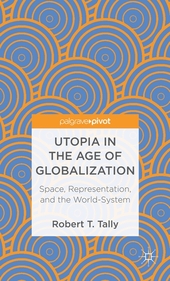Utopia in the Age of Globalization: Space, Representation, and the World System (London: Palgrave, 2013).

Although normally associated with modernity or modernism, utopia has made a comeback in the age of globalization. Just as the discoveries of the New World and the social upheavals of early modern Europe inspired Thomas More's Utopia and its many descendants, the bewildering technological shifts and economic uncertainties of the present era call for new approaches. The explosion of utopian studies since the 1960s, particularly in the work of such theorists
as Herbert Marcuse and Fredric Jameson, suggests that utopia may find its true vocation as both a critical practice and anticipatory desire in this postmodern moment of global capitalism. In Utopia in the Age of Globalization, Robert T. Tally Jr. draws upon recent utopian theory to argue that utopia is best understood today, not as an ideal society or a future state, but as a mode of literary cartography. The utopian project is an attempt to map the present world system in its totality.
Contents: Preface, Acknowledgements, Introduction: 'A map of the world which does not contain Utopia', 1. The End of Utopia at the Present Time, 2. A Meditation on the Impossible, 3. Power to the Imagination, 4. Mapping the Postnational World System, Conclusion: Hic Sunt Dracones, Bibliography, Index
Praise for Utopia in the Age of Globalization
"A timely and significant intervention in contemporary discussions of globalization and utopia. The scope of the book is wide-ranging and ambitious, touching on a richly diverse set of topics, including contemporary critical theory, the figure of the world market, financial derivatives, the spaces of the global city, and narrative." — Phillip E. Wegner, Marston-Milbauer Eminent Scholar, University of Florida, USA.
